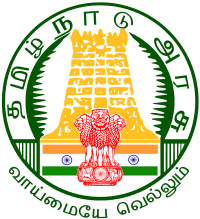 | |
| State | Tamil Nadu |
|---|---|
| Country | India |
| Website | www |
| Legislative branch | |
| Assembly | |
| Speaker | M. Appavu, DMK |
| Deputy Speaker | K. Pitchandi, DMK |
| Members in Assembly | 234 |
| Meeting place | Fort St. George |
| Executive branch | |
| Governor | R. N. Ravi |
| Chief Minister | M. K. Stalin, DMK |
| Deputy Chief Minister | Udhayanidhi Stalin, DMK |
| Chief Secretary | N. Muruganandam IAS |
| Headquarters | Chennai |
| Departments | 43 |
| Judiciary branch | |
| High Court | Madras High Court |
| Chief Justice | K. R. Shriram |
The Government of Tamil Nadu (Tamil: Tamiḻnāṭu aracu; IPA: [t̪əmɪɻnɑːɖʉ əɾəsʉ]) is the administrative body responsible for the governance of the Indian state of Tamil Nadu. Chennai is the capital of the state and houses the state executive, legislature and head of judiciary.
Under the Constitution of India, de jure executive authority lies with the governor, although this authority is exercised only by, or on the advice of, the chief minister, the de facto authority and the cabinet. Following elections to the Tamil Nadu Legislative Assembly, the state's governor usually invites the party (or coalition) with a majority of seats to form the government. The governor appoints the chief minister, whose council of ministers are collectively responsible to the assembly.
Legislative assembly elections are held every five years to elect a new assembly, unless there is a successful vote of no confidence in the government or a two-thirds vote for a snap election in the assembly, in which case an election may be held sooner. The legislature of Tamil Nadu was bicameral until 1986, when it was replaced by a unicameral legislature. The judiciary branch is led by a High Court (Madras High Court) led by a Chief Justice.